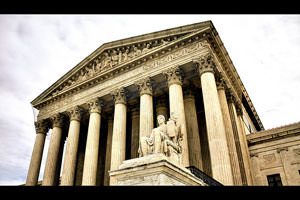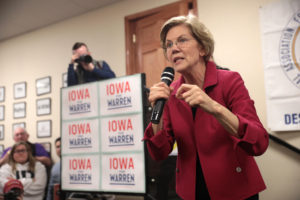Defending the Supremely Powerful
The United States Supreme Court now sees its central task as comforting the already comfortable and afflicting those already afflicted.
The United States Supreme Court now sees its central task as comforting the already comfortable and afflicting those already afflicted.
If you are a large corporation or a political candidate backed by lots of private money, be assured that the court’s conservative majority will be there for you, solicitous of your needs and ready to swat away those pesky little people who dare to contest your power.
This court has created rules that will have the effect of declaring some corporations too big to be challenged through class actions, as AT&T consumers and female employees at Wal-Mart discovered.
And remember how sympathetic conservatives are supposed to be to the states as “laboratories of democracy,” pioneering solutions to hard problems?
Tell that to the people of Arizona.
They used a referendum to establish a highly practical system of financing political campaigns designed to reduce corruption and give a fighting chance to candidates who decide to forgo contributions from special interests.
The people acted, noted Justice Elena Kagan in a brilliantly scalding dissent, after a scandal in which “nearly 10 percent of the state’s legislators were caught accepting campaign contributions or bribes in exchange for supporting a piece of legislation.”
Under Arizona’s “clean elections” initiative, candidates who raised a modest amount in very small contributions could receive a lump sum of public money. They could raise no further private funds.
No candidate had to join the public system. But if a privately financed candidate or the interest groups supporting his or her campaign started outspending one who was publicly financed, the public system came to the rescue with additional cash so the “clean money” candidate wouldn’t be blown out of the race by lethal dollar bills.
Why was this important? Kagan was spot on: “Candidates will choose to sign up” for public funding “only if the subsidy provided enables them to run competitive races.” Such breathtaking common sense has been missing from the majority’s recent campaign finance decisions — notably its Citizens United ruling, also a 5-4 conservative ukase, allowing our poor beleaguered corporations to expand their power in American politics.
Here’s the stunning part: For years, opponents of campaign finance reform have accused those who want to repair the system of trying to reduce the amount of political speech. But Arizona’s law, as Kagan pointed out, “subsidizes and so produces more political speech.” And then there was this shot at Chief Justice John Roberts’ majority opinion: “Except in a world gone topsy-turvy, additional campaign speech and electoral competition is not a First Amendment injury.”
Indeed, Roberts had to argue that those terribly downtrodden candidates financed with private money had their speech “burdened,” simply because their publicly financed opponents had the means to respond.
Kagan and the dissenters stood up for free speech. Roberts’ majority defended paid speech. The dissenters want to allow candidates to talk; the majority wants to enhance money’s ability to talk.
Roberts was especially exercised over any notion of “leveling the playing field” between private-money candidates and their challengers. He even included a footnote calling attention to the Citizens Clean Elections Commission website that once said the law was passed “to level the playing field when it comes to running for office.” Horrors!
Kagan archly noted the “majority’s distaste for ‘leveling,’ ” and then dismissed its obsession, observing that Roberts failed to take seriously the Arizona law’s central purpose of containing corruption. Leveling was the means, not the end.
Nonetheless, pay heed to how this conservative court majority bristles at nearly every effort to give the less wealthy and less powerful an opportunity to prevail, whether at the ballot box or in the courtroom. Not since the Gilded Age has a Supreme Court been so determined to strengthen the hand of corporations and the wealthy. Thus the importance of the Wal-Mart and AT&T cases, the latter described by The New York Times as “a devastating blow to consumer rights.” Will the court now feel so full of its power that it takes on the executive and legislative branches over the health care law?
In 1912, Theodore Roosevelt warned that the courts had “grown to occupy a position unknown in any other country, a position of superiority over both the legislature and the executive.” Worse, “privilege has entrenched itself in many courts just as it formerly entrenched itself in many legislative bodies and in many executive offices.”
What happens to a democracy when its highest court dedicates itself to defending privilege? That’s the unfortunate experiment on which we are now embarked.
E.J. Dionne’s e-mail address is ejdionne(at)washpost.com.
© 2011, Washington Post Writers Group
Your support matters…Independent journalism is under threat and overshadowed by heavily funded mainstream media.
You can help level the playing field. Become a member.
Your tax-deductible contribution keeps us digging beneath the headlines to give you thought-provoking, investigative reporting and analysis that unearths what's really happening- without compromise.
Give today to support our courageous, independent journalists.






You need to be a supporter to comment.
There are currently no responses to this article.
Be the first to respond.